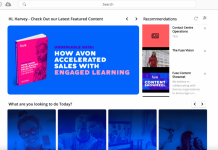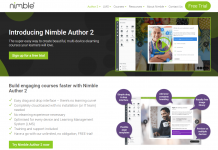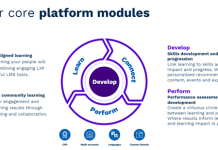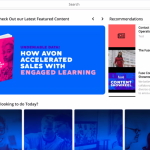In this product review we take a good look at Looop – a solution that is much more than a learning management system or knowledge sharing tool – it’s a highly engaging productivity and performance platform. Some major brands, such as Sky, asos, Pearson and Money Supermarket, are already using Looop – here’s why they’re not wrong…

While it is not fair to argue that elearning and learning technologies industries have been a unified and monolithic entity (marketing departments have driven differentiation), it is fair to say that they have broadly travelled in the same direction, with a fundamental belief that technology can improve learning and development.
However, I do feel we are now coming to a fundamental fork in the road with learning technologies in the workplace as economies grapple with a productivity conundrum – contradicted by the rapid acceleration of technology in the workplace.
Many would argue that L&D remains massively under–innovated when compared to the media industry or more particularly the IT productivity stack. The challenge for L&D is now surely one of closing the productivity gap.
Learning Light has long maintained that companies do not buy good practice, they buy performance and this mantra is in their very DNA (or should be) if they wish to succeed. By performance we mean 2 things in essence…..reducing cost or adding value for the organisation.
There is no longer any doubt that elearning courses have been hugely successful in reducing costs of training, principally in Health and Safety and other compliance areas, but in adding value to organisations – here we will see the new fork in the road.
No, we are not going down the learning analytics road in this piece, but that will play a major role in this, we have no doubt.
Increasingly, organisations will face choices in the learning architecture they choose for their organisation. The choices will not be mutually exclusive, but will in some way be decided in the organisation’s learning value chain with differing learning solutions applied to differing components in that chain.
Organisations will continue to drive out costs in many parts of the business, but while adding value, and that means productivity will become much much more important as the nature of the labour market changes in most western economies.
So, these are the forks in the road that will increasingly see organisations with a learning solution stack aligned to the differing requirements of the organisation’s learning value chain addressing performance and productivity over and above cost.
Some components of the learning value chain will focus on utilising best of breed solutions from varying external vendors with a large library of external OTS courses from Skillsoft, LinkedIn learning (Lynda) or Degreed for example.
Should these providers fail to meet the organisation’s requirements they will be quickly and ruthlessly swapped out for other vendors – xAPI and learning analytics will see to that.

There will be room for high-quality bespoke building of specific courses, increasingly in Virtual Reality where realism and impact is king, but certainly not for the everyday on demand mobile or social learning experience.
We now see the emergence of very quickly custom built, available on-demand learning that is highly orientated to the organisational day to day of doing business, deployed at the point of need. The learning can be quickly and easily found, and is fully in the context of the organisation’s requirements and plugged into the productivity tech stack, not in a disparate, out of context learning system.
It is this organisational segment that the learning environment, Looop, is firmly aimed at.
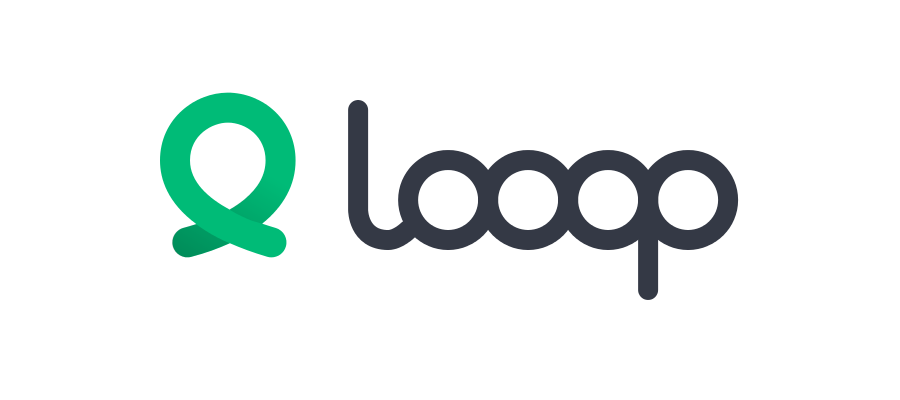
Looop is not alone in this, as many LMS offer efficient and effective content creation environments in the platform to meet this growing need. It’s just that in our view, Looop does this very well and with purpose.
Looop is interesting and innovative for several reasons. Firstly, it is elegant, simple and effective to use as a platform and learning creation environment, with a clean and easy UI/UX that makes it approachable, with considerable emphasis on search capabilities.
Course or resource search is one of my particular bugbears…. if learners cannot find what they are looking for in the learning environment in the organisation quickly there will be issues! (Sadly in my experience too many LMS platforms fail in this area and the issues are clear to see).
Issue 1 is lack of engagement, issue 2 is for learners to find the solution themselves…. usually via a Google or other search…. which presents issue 3…… just how good (or factually accurate or culturally appropriate) is what they have found?
I digress for a reason and the reason is that this recognition of how learners tend to learn forms the underlying principles of the Looop solution and fast, accurate search is a key component to this Looop learning platform.
Looop is designed to deal with these issues and make learning work for the organisation effectively and efficiently. Looop is more than a platform, it is a problem-solving solution for the day to day.
Let’s step through the principles – the thinking that is behind Looop.
Looop is refreshing in its recognition of the modern learner and the modern workplace and it starts with some simple premises but actually provides a sophisticated solution.
Looop recognises that employees want answers to problems or issues that are getting in the way of doing their job instantly, not on a vanilla course, but a solution in the context of the organisation.
Speed of search and context of content are principles 1 and 2 respectively of the Looop approach to learning.
In many learning requirements….. ”I need to know how to do this” situations, learners would either ask a colleague or all too often “Google it”. As noted above, a search engine may not provide the right answer and its context to the organisation might not be great. A colleague is usually a better bet to ask!
Here Looop principle 3 comes into play, Looop is about “un-packing the organisation’s knowledge”.
This is not about individuals setting up pages in Sharepoint about their skills and abilities and hoping someone someday will ask them a question (good practice …. sure…… enhancing the organisation’s performance…… not so sure). No, this is about building learning vignettes in Looop that reflect the context of the organisation in the day to day. This is how we do things round here in this company!
Looop is making this work in some impressive organisations and the team have built a robust approach to ensure this un-packing of the organisation’s knowledge takes place to ensure that performance is enhanced by solving problems, adding value and more.
Yes, the Looop platform makes it pretty easy to build out these vignettes by following a series of simple but effective steps to build out context-led learning vignettes quickly, easily and with a very high certainty that organisational performance improvement will be the end result.
It is however, the approach that is perhaps the most interesting in how it is applied.
The approach starts by putting the learner’s concerns at the centre of the process, asking what are the barriers and issues they face in the day to day.
The answers are “unpacked” from the organisation and put into context. Context is given greater weight than the quality of the content. No, we are not aligning learning to organisational strategy as a hundred vendors (or more) will tell me that this is what they are doing at The Learning Technologies show. Looop is working in the organisation’s unique learning value chain to improve immediate performance with contextualised content.
An agile development approach is used at all times and the solution is iterated quickly with feedback from learners and the organisation’s experts. The learning approach is to use a mix of: show me, tell me and inspire me. Additional materials for download such as checklists or procedures are added.
Rigorous attention is paid to keeping the materials real and relevant as part of the design and build process. Part of this relevance is further enhanced “injecting the learning materials” into the organisations existing productivity suite.
Learner activation is a key principle and the Looop solution with its focus on federated search, leading to a speedily found solution that is at the point of need, that is highly relevant and in context undoubtedly delivers engagement and performance improvement.
Looop allows for learners to offer feedback which is common. Looop is not about allowing learners to add their own content in an ad-hoc manner, but about unpacking organisational knowledge that solves problems and the feedback opportunity is firmly about assessing usefulness.
Looop allows for the assignment of activities to learners and provides a very effective reporting suite as well. The reporting measures both the “usefulness of the learning” and the engagement levels with the learning across the organisation.
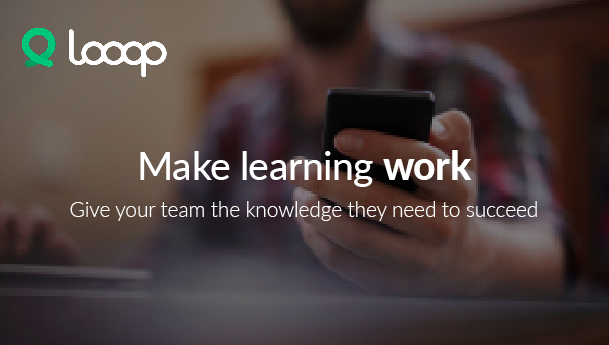
Looop has many of the features that a modern LMS offers. It allows for the creation of learning materials and the very easy curation of learning materials from the internet. Looop can manage face to face learning event. However, Looop is not an LMS built to do everything and make the tea, Looop is simple to use but something that is producing a sophisticated solution in enhancing organisational performance and productivity.
In summary, Looop is a platform that has been created after a great deal of insight has been gained into how individuals in modern organisations learn. David James is Looop’s learning strategist (and one of the UK’s leading learning strategists) and he has clearly worked with a talented team of developers to produce something that meets the modern learner and the way they want to learn in the day to day…. on their terms and ….. it works.
Learn more on the Looop website

David Patterson
Lead eLearning Consultant
About David
Our lead elearning consultant David Patterson is an expert in training technologies such as learning management systems, and in elearning best practices.
He has helped many public and private sector organisations across the UK, Europe and worldwide to create and deliver engaging, effective elearning.
David is joint author of several research papers including the highly acclaimed Learning Light reports on the UK elearning market.



